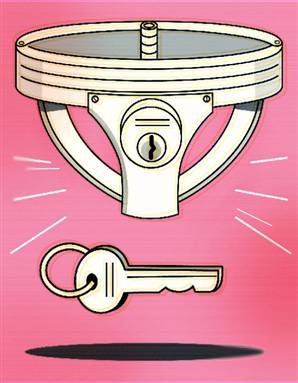Personal Ruminations of the Technology of Government and Its Impact on Gender and Sexuality As Presented in The Handmaid’s Tale and in Real Life
In class we discussed the many levels of human civilization both real and imaginative. Utopia in its Greek derivation means “no place”—an ideal but fictionalized world as proposed by Sir Thomas More. Eutopia means “good place”—an ideal and real world. Dystopia means “bad place”—often depicted as a totalitarian world that is the opposite of utopia. Anti-utopia is an intended utopia that became twisted somehow. Hannah’s post, An Infinite Circle of Anti-Utopias, made me wonder about how governments are formed. I agree with Hannah that civilizations are in a constant cycle. From my general knowledge of human history, I know that when the people of a nation/civilization are displeased with their government, they will fight to overthrow that government only to replace it with another one. Think of the American Revolution, French Revolution, Russian Revolution, Spanish-American War, and the list goes on. From an absolute/divine rule to a constitutional monarchy, to democracy, to even communism and fascism, we can see that humanity has long endeavored to create the perfect society in what seems to be a trial and error process. I see the creation of governments as a technology in the sense that so much human consciousness goes into planning a functional and ideal society as well as implementing the laws that govern. My question: how far will people go to achieve an ideal world? Margaret Atwood answered that question with The Handmaid’s Tale: as far as they have to.
I believe that the human quest to create the perfect society is the ultimate human experiment and perhaps in ruling over a population there is no single formula for constructing the best government. Perhaps the question is not about building the perfect or the best civilization through the perfect or the best government but rather is about forming a functional nation through a functional administration. In Atwood’s novel, the Commander points out to Offred that “[b]etter never means better for everyone…It always means worse for some” (p.211). When Bill Moyers interviewed Atwood about her personal thoughts on faith and reason, I was struck by her belief that if put under enough stress, societies will give up personal freedoms for self-preservation. The Handmaid’s Tale, though often labeled as a fictional novel (sometimes science fiction, though the author disagrees with this categorization), Atwood mentioned in her interview that it was a “blueprint” of what has already happened in human civilizations and what could happen when humanity is put under extreme circumstances. The passing of the Patriot Act after the terrorist attack on 9/11 is a prime real life example. At an alarmingly rapid rate Americans for the most part were accepting of the new restrictions on their personal freedoms including intrusive searches of luggage in U.S. airport checkpoints and phone call monitoring. These new restrictions though understandably controversial, were adhered by most Americans out of fear. The often-labeled “dystopia” that is the Republic of Gilead in the novel poses the frightening revelation that the United States, though a present day democracy, can one day become a totalitarian theocracy. When the mass sterilization of both men and women occurred due to environmental pollution and the spread of STDs as mentioned in the epilogue, Gilead overthrew what once was the United States and implemented old testament teachings through the commodification of fertile women in a last-ditch effort to perpetuate humanity in the republic and therefore preserve itself. All women with viable ovaries, regardless of sexual preference, were coveted and employed as handmaids to give birth to the next generation. All women with inviable ovaries were, however, considered “Unwomen” and consequently shipped to the “Colonies”, a possible euphemism for some dumpsite (for all of humanity’s wastes, human or otherwise) outside the confines of Gilead. Babies, even, were categorized into “Unbabies” and “Keepers”. Unbabies are babies with deformities deemed unfit for society and were disposed of (though Offred did not want to know about the details) while Keepers are their perfectly healthy counterparts.
In our present day, we can already see an example of a governments taking control of the sexuality of its citizens by restricting reproductive choices—what I consider are basic freedoms. China’s one-child policy is a twisted example of the family policies of Gilead. To address the overpopulation crisis in China, its government has implemented financial incentives such as bonuses and retirement funds (1) since 1979 for families to produce only one child.
So far, Chinese officials have claimed that the policy has proven effective in decreasing the birthrate by preventing more than 400 million births (2), and will therefore continue the incentives (2,3). However, the critics fear that the current system will only result in skewed demographics in later generations. Others, myself included, have criticized the policy for not only unfairly directing family planning, which should be a personal decision, but also for facilitating a gender preference thus resulting in abortions of or the giving away of female babies. Though China’ family planning policy limits the number of children per family in order to remedy its overpopulation crisis, Gilead’s policy instead mandates that all women with viable ovaries reproduce in order to solve its underpopulation dilemma. Both the Republic of Gilead and the People’s Republic of China, however, exemplify the extreme measures governments would and could enact on female sexuality by directly affecting family planning in order to respond to some external pressure that threatens the very future of their populations.
These governmental restrictions and mandates on female sexuality presented in China and Gilead present what I feel is an uncomfortable intrusion on one’s privacy. Although the United States currently has a freer policy on family planning since birth control, abortion, and emergency contraceptives are legal, I fear that the government still has some bearing over our sexualities in some aspects. Take, for instance, my public, government-funded high school and the way it handled mandated sex education. I see that the abstinence education only policy is one of the many ways the government is implementing a religion-based importance on virginity—a social construction (Jessica Valenti, and professional feminist and founder of Feministing, mentioned in her recent lecture at BMC that there is no medical definition for virginity). I believe that the students are not given a balanced sex education since only abstinence until marriage is stressed. I believe a balanced sex education requires both lectures on abstinence as well as safe sex practices such as the usage of condoms. It does not make sense to me that my classmates and I were being bombarded with videos on the dark side of single, underage motherhood with the goal of scaring us all into staying abstinent when we were not given an education on safe sex practices in case we find ourselves in the heat of the moment. By preaching only abstinence before marriage, the public school system, as mandated by the government, does not provide adequate sex education to prepare coming-of-age students when they are faced with the realities of life. Furthermore, this is just another intrusion of the government on the burgeoning sexualities of teenagers that, I feel, they must discover for themselves. I am not saying that abstinence is itself a deleterious idea, but an abstinence only education is dangerous. I am convinced that amidst the hormonal changes that signal puberty, sex among the teenage population will and does happen. An imbalanced, abstinence only education only leads to confusion for the already stressed out teen.
In my ponderings about the technology of government—the formation of laws from philosophical ruminations and enforcement of such—I conclude that governments are formed in response to the people and in response to the external pressures that could endanger the very futures of the people. As Atwood said in her interview with Moyers, if one were to turn the United States into a totalitarian government (the United States into Gilead), one would not say, “Let’s be Communist”, one would instead say something twisted yet faintly inspirational such as, “In order to preserve our freedoms, we have to give them up for now”. In the novel, Gilead was formed in response to too much freedom. As said by Aunt Lydia and reminisced by Offred, “There is more than one kind of freedom…Freedom to and freedom from. In the days of anarchy, it was freedom to. Now you are being given freedom from. Don’t underrate it”(p. 24). Gilead, in response to mass sterilization and underpopulation, mandated that all women with all viable ovaries become handmaids regardless of sexual preference. China, in response to overpopulation, has implemented a one-child policy through financial incentives. The United States, in response to what seems a religious and cultural obsession over virginity, has commanded an imbalanced abstinence only sex education policy in public schools. All of these constraints in their own ways put limits on sexuality especially female sexuality. In Gilead, women are told to reproduce. In China, women are told to produce just one. In the United States, teenage women are told not to discover their sexualities before marriage. If the United States faced a health crisis similar to that of Gilead, will the government advance a policy requiring women with viable ovaries to produce? Margaret Atwood already answered that question: yes. The government already has control over our bodies anyway.
(1) China gives one-child families incentives
Comments are closed.



Many thanks for including images and a video as part of your argumentation here.
This paper covers quite a bit of territory (as you yourself acknowledge, w/ your title about “ruminations” and your conclusion about “ponderings”); it needs a whole lot of paring down!
Going through that process of winnowing, I was struck, first, by the analogies you developed between the range of (different) controls on women’s sexuality enacted by the governments of Gilead, China and the U.S. Your analysis of that spectrum is acute, and sets you up for a far more interesting conclusion than the one you actually supply. You really sort of throw away the ending of your essay, in saying that “the government already has control over our bodies anyway.” You started in a much more complicated place, with a review of the multiple different ways in which humans have repeatedly experimented with the “technology” that is government. Given that we need such structures, and are always tinkering with them, what are the better forms they might take?
Perhaps my deepest question for you, though, has to do with your own utopia, which I think is quite embedded (though not quite acknowledged) in this paper. When you say that you have criticized China’s policy for “unfairly directing family planning, which should be a private decision,” when you say that government restrictions constitute “an uncomfortable intrusion on one’s privacy,” and when you argue that teenagers must discover their “burgeoning sexualities” for themselves, I hear a range of libertarian presumptions: that sexuality exploration is private, that sexual practices should not be mandated.
Is that a “no-place”? Or a “good” one? Utopic or Eutopic? And entirely without government?